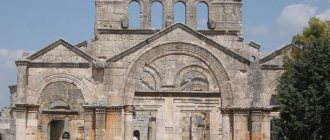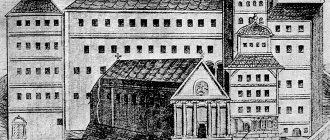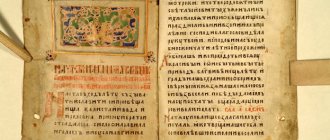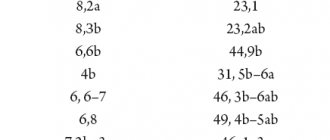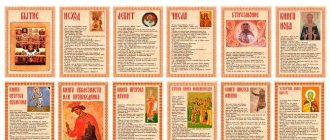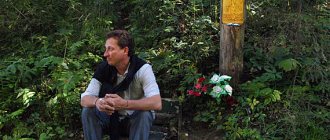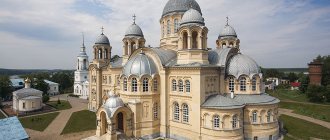Rev. Simeon the New Theologian - Works and Hymns
1 …
Works and Hymns
THE LIFE OF REVEREND SIMEON NOVAGO THEOLOGIST
The Monk Simeon was born in the Paphlogonian village of Galata from noble and wealthy parents. His father's name is Vasily, and his mother's name is Feofaniya. From childhood he showed both great abilities and a meek and reverent disposition, with a love of solitude. When he grew up, his parents sent him to Constantinople to his relatives, not the least at court. There he was apprenticed and soon completed the so-called grammar courses. It was necessary to move on to philosophical ones; but he refused them, fearing to be carried away into anything indecent due to the influence of the partnership. The uncle with whom he lived did not force him, but hastened to introduce him to the career path, which in itself is a rather strict science for those who are attentive. He introduced him to the kings of the self-brothers Vasily and Constantine, the porphyry-born, and they included him in the rank of courtiers.
But the Monk Simeon cared little about the fact that he became one of the royal synclite. His desires were directed toward something else, and his heart lay elsewhere. While still studying, he became acquainted with Elder Simeon, who was called the reverent one, visited him often and used his advice in everything. It was all the more free, and at the same time more necessary, for him to do this now. His sincere desire was to quickly devote himself to a world-denying life; but the elder persuaded him to have patience, waiting for this good intention of his to mature and take deeper root, because he was still very young. He did not leave him with advice and guidance, gradually preparing him for monasticism and among worldly vanity.
The Monk Simeon himself did not like to indulge himself, and during the usual labors of self-mortification, he devoted all his free time to reading and prayer. The elder supplied him with books, telling him what he should especially pay attention to in them. One day, handing him a book of the writings of Mark the ascetic, the elder pointed out to him the different sayings in them, advising him to think about them more carefully and guide his behavior according to them. Among them was the following: if you always want to have soul-saving guidance, listen to your conscience and urgently carry out what it will inspire you. This is the saying of the teacher. Simeon took it to his heart as if it were coming from the mouth of God himself, and decided to strictly listen and obey his conscience, believing that, being the voice of God in the heart, it always inspires one soul-saving thing. From then on, he devoted himself entirely to prayer and teaching in the Divine Scriptures, staying awake until midnight and eating only bread and water, and taking only as much of it as was necessary to maintain life. So he went deeper and deeper into himself and into the realm of God. At this time he was granted that grace-filled enlightenment, which he himself describes in his word on faith, speaking as if about another certain young man. Here the grace of God allowed him to taste more fully the sweetness of life according to God and thereby suppressed the taste for everything earthly.
After this, it was natural for him to feel a strong impulse to leave the world. But the elder did not deem it good to satisfy this impulse immediately, and convinced him to endure more and more.
Six years passed like this. It happened that he needed to leave for his homeland, and he came to the elder to receive the blessing. Although the elder told him that now was the time to enter monasticism, he did not keep him from visiting his homeland. The Monk Simeon gave his word that as soon as he returned, he would leave the world. On the way, he took the Ladder of St. for guidance. John Climacus. Arriving at his homeland, he did not get carried away with everyday affairs, but continued the same strict and solitary life, for which the domestic order gave great scope. There was a church nearby, and next to the cell’s church and not far from it there was a cemetery. In this cell he secluded himself - he prayed, read and indulged in the thought of God.
At one time he read in the Holy Ladder: insensibility is the mortification of the soul and the death of the mind before bodily death, and he became zealous to banish this disease of insensibility from his soul forever. For this purpose, he went out to the cemetery at night and prayed earnestly there, thinking together about death and the future judgment, as well as about the fact that the dead on whose tombs he prayed were now dead, who were alive like him. To this he added a stricter fast and a longer and more vigorous vigil. Thus, he kindled within himself the spirit of life according to God, and its burning kept him constantly in a state of contrite tenderness that did not allow insensibility. If it happened that cooling was approaching, he hurried to the cemetery, cried and sobbed, beating his chest, and did not get up from his place until the usual tender contrition returned. The fruit of this course of action was that the image of death and mortality was so deeply imprinted in his consciousness that he looked at himself and others no differently than at the dead. Because of this, no beauty captivated him, and ordinary carnal movements froze at their very appearance, being burned by the fire of contrition. Crying became food for him.
The time has finally come to return to Constantinople. His father asked him to stay at home while he saw him off to the next world; but seeing where his son’s fiery desire was heading, he said goodbye to him with love and willing blessing.
The time of returning to Constantinople was for the Monk Simeon the time of renunciation of the world and entry into the monastery. The elder received him with fatherly embraces and introduced him to the abbot of his Studian monastery, Peter; but he gave it back into the hands of the elder, that great reverent Simeon. Having accepted the young monk as God’s pledge, the elder led him into one small cell, more like a tomb, and there he outlined for him the rules of the cramped and regrettable monastic life. He told him: look, my son, if you want to be saved, go to church without hesitation, and stand there with reverent prayer, without turning here and there and without starting conversations with anyone; do not go from cell to cell; do not be bold, keeping your mind from wandering, paying attention to yourself and thinking about your sinfulness, death and judgment. - In his severity, the elder observed, however, a prudent measure, taking care that his pet did not have an addiction even to strict feats. Why sometimes he assigned him obediences that were difficult and humiliating, and sometimes easy and honest; sometimes he intensified his fasting and vigil, and sometimes he forced him to eat his fill and sleep enough, in every possible way accustoming him to renounce his will and his own orders.
The Monk Simeon sincerely loved his elder, honored him as a wise father, and did not deviate even a hair's breadth from his will. He was so in awe of him that he kissed the place where the elder prayed, and he humbled himself so deeply before him that he did not consider himself worthy to approach and touch his clothes.
This kind of life is not without special temptations, and the enemy soon began to build them for him. He brought upon him heaviness and relaxation throughout his whole body, followed by desolation and clouding of thoughts to the point that it seemed to him as if he could neither stand, nor open his lips to prayer, nor listen to church services, nor even express his grief to his mind. . Realizing that this state did not resemble either the usual fatigue from work or illness, the monk armed himself against it with patience, forcing himself not to relax himself in anything, but, on the contrary, to strain himself to do the opposite of what was suggested, as a useful means of restoring his usual state . The struggle, with the help of God and the prayers of the elder, was crowned with victory. God consoled him with this vision: like a cloud rose up from his feet and dissipated in the air, and he felt vigorous, alive and so light that it was as if he had no body. The temptation passed away, and the monk, in gratitude to the Savior, decided from then on never to sit down during divine services, although this is permitted by the charter.
Then the enemy raised him up with carnal warfare, confusing him with thoughts, disturbing him with movements of the flesh, and in his sleep he presented him with shameful imaginations. By the grace of God and the prayers of the elder, this battle was also driven away.
Then his relatives and even his parents stood up, pityingly persuading him to moderate his severity, or even leave monasticism altogether. But this not only did not detract from his usual exploits, but on the contrary strengthened them in some parts, especially in relation to solitude, withdrawal from everyone and prayer.
Finally, the enemy armed the brethren of the monastery, his companions, against him, who did not like his life, although they themselves did not like licentiousness. From the very beginning, some of the brothers treated him favorably and with praise, while others disapproved, with reproaches and ridicule, more behind his back, and sometimes even to his face. The Monk Simeon did not pay attention to either praise or reproach, or veneration or dishonor, and strictly adhered to the rules of internal life and external behavior established by the advice of his elder. And the elder often renewed his convictions to him to be firm and to endure everything courageously, and especially to try to tune his soul in such a way that it would most of all be meek, humble, simple and gentle, because the grace of the Holy Spirit usually dwells in such souls only. Hearing such a promise, the monk intensified his zeal for life according to God.
1 …
End of introductory passage DID YOU LIKE THE BOOK?
This book costs less than a cup of coffee! FIND OUT PRICE
